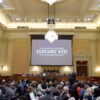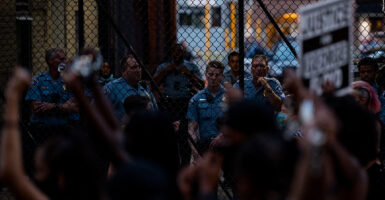At the end of June, the Minneapolis City Council voted unanimously to “defund” the city’s police. Now crime is on the rise.
John Hinderaker, president of the Minnesota policy organization Center of the American Experiment, joins the show to explain what the future may hold for the Minneapolis Police Department and what his organization is doing to support local law enforcement.
We also cover these stories:
- New York Attorney General Letitia James, a Democrat, moves to shut down the National Rifle Association.
- The votes of more than 84,000 New York City residents weren’t counted during the summer’s Democratic primary.
- A Secret Service report reveals that many shootings are carried out with illegal guns.
“The Daily Signal Podcast” is available on Ricochet, Apple Podcasts, Pippa, Google Play, and Stitcher. All of our podcasts can be found at DailySignal.com/podcasts. If you like what you hear, please leave a review. You can also leave us a message at 202-608-6205 or write us at letters@dailysignal.com. Enjoy the show!
Virginia Allen: I am joined by John Hinderaker, president of the Center of the American Experiment, a prominent think tank just outside of Minneapolis, Minnesota. John, thanks so much for being here today.
John Hinderaker: Hey, happy to do it.
Allen: Before we get into what is happening on the ground in Minneapolis, in the wake of George Floyd’s death, could you just take a minute to briefly explain what the Center of the American Experiment does? What is really your primary mission?
Hinderaker: We are a policy organization, conventionally referred to as a think tank. We are the conservative policy organization in Minnesota. We’re very aggressive for a think tank. We put up billboards. We put ads on the radio. We write a ton of op-eds. We’re very active all over the state of Minnesota, as we try to swing public opinion to the right.
Allen: Tell us a little bit specifically about kind of the political dynamics in Minneapolis. I’m an East Coaster. I don’t know a ton about Minnesota as a state, and kind of the political leanings of the state. So just fill us in. Is Minneapolis a pretty progressive community?
Hinderaker: It’s ridiculously left-wing—not to sugarcoat it. Minnesota is like so many states, where there’s a sharp divide between urban and rural. The Twin Cities metropolitan area is generally pretty liberal, and in greater Minnesota, the rest of the state is conservative and getting more conservative all the time.
Within the Twin Cities Metro, the city of Minneapolis itself is really left-wing. You could compare it to Seattle and Portland. This is [Rep.] Ilhan Omar’s district. She represents Minneapolis and some first-tier suburbs. So that’s the basic landscape, that the suburbs are swing territory, but those cities of Minneapolis and St. Paul are really on the left.
Allen: So May 25, George Floyd is killed by a police officer. And wow, it does not take long at all before there are literally cries in the streets from protesters and rioters demanding that the Minneapolis Police Department be defunded. And at the end of June, the City Council did vote unanimously to defund the police department.
But what exactly does that mean? I mean, surely that doesn’t mean that all of the law enforcement in Minneapolis just goes away overnight. I mean, can you explain a little bit about what that vote actually changed in the city of Minneapolis?
Hinderaker: Well, it’s a really good question, Virginia, and there’s no really clear answer. Part of the background here is that the Minneapolis City Charter requires the city to fund and maintain a police department of a certain size, as a percentage of the population of the city. So the Minneapolis City Council cannot legally defund the police department.
So this resolution that they passed is intended to sort of take steps in that direction via an amendment to the Minneapolis City Charter, which its proponents wanted to have on the ballot in November.
There’s something called the Minneapolis Charter Commission. And so this resolution went to them, and just a day or so ago, they voted, I think, 10-to-5, not to put this issue on the ballot for November. And apparently they’ve just got broad discretion to say, “No, we’re not going to do that.”
Allen: Wow.
Hinderaker: I think their hope is that things cool down and that nothing really stupid happens.
Allen: So as of right now, it’s not like police are being laid off and sent home?
Hinderaker: Well, actually, that’s a great question too, because what is happening is that police are retiring. Police are going on disability. The city canceled an incoming class of trainees, so apparently that’s a year’s worth of police officers that won’t be brought on board. And the effective police force in Minneapolis, I believe, has now dropped below the level that is mandated by the City Charter. So where that goes from here, we really don’t know.
Allen: What are the locals saying? Is kind of the tone that you’re getting from most of the people in Minneapolis like, “Yes, this is good. The police department should be smaller. We should cut off funding”? Or are they kind of saying, “Wait a second. When I call 911, I actually want someone to be on the other end of that call”?
Hinderaker: Yeah. Well, it depends where in Minneapolis you live. If you live in the wealthy southwestern part of the city, for example, you probably have got a Black Lives Matter sign in your yard and are happy to talk about defunding the police.
If you’re one of the black residents in North Minneapolis, you’re probably clamoring for more police support. Those are the people who know that they need the police. They need them in their neighborhoods, and they want more policing, not less.
But let me just add this too, Virginia, because one of the things that my organization, Center of the American Experiment, does is quarterly polling in Minnesota. And we’ve polled these issues, these police issues, rather extensively. And what we find is that about 85% of Minnesotans support their local police department.
We phrase that a couple of different ways, but that’s a fair paraphrase. About 85% statewide support their local police department. They certainly don’t want to defund it. But the two places in Minnesota where that’s not true, where our police departments really don’t have majority support, are the cities of Minneapolis and St. Paul. So you do have some kind of eccentric ideology there that really is anti-law enforcement.
Allen: And crime-wise, what is happening in those cities right now?
Hinderaker: Oh, crime has jumped. I mean, if you see a map, somebody has been maintaining a map with a yellow dot on it wherever there’s an episode of gunfire occurring within the city limits of Minneapolis, and it’s unbelievable. I mean, the city is practically covered in yellow dots. Homicides are up. Violent crime is up. Nonviolent crime is up, as you would expect.
This was called the Ferguson effect, when it happened following the riots in Ferguson, Missouri, and now it’s the Minneapolis effect. When you have this kind of broad attack on law enforcement, police officers understandably pull back, and they don’t do as much discretionary work. And so stops of all kinds—traffic stops, stops on the street—are down by 70%, 80%, 90%. And when that happens, you inevitably will see a spike in the crime rate.
Allen: How are city leaders responding to that? Do they recognize this is a problem, and we need to actually do something, and begin supporting our police department again?
Hinderaker: It’s really interesting because for the last 40 years, every single person who has had any responsibility for the Minneapolis Police Department has been a Democrat. And that’s true today.
These members of the City Council, they run against the police department when they’re running for office. But there isn’t anybody who can change the Minneapolis Police Department, there’s nobody in the world who can do anything about the Minneapolis Police Department, except the mayor and the City Council of the city of Minneapolis. It’s their police department, and they refuse to take any responsibility for it. So it’s a really dysfunctional situation.
Jacob Frey, the boy mayor, I call him, he’s like 36 or 37, something like that, of the city of Minneapolis, is on the outs with the far left right now because at a big public gathering he said that he was not in favor of disbanding the Minneapolis police force. Which is, I think, the only sane position you can take. He was booed off the stage—
Allen: Wow.
Hinderaker: … and has fallen into disfavor with the far left. So that’s kind of where it sits.
Allen: Wow. So you all at the Center of the American Experiment, you’ve stepped up, you’ve said, “We want to give voice to kind of the other side of this debate.”
So you all put up 38 different billboards around the city, which feature quotes from local media reports on the violent attacks that have taken place in your community, really just since the end of May. Can you explain a little bit about why you all chose to set up those billboards?
Hinderaker: Yeah, sure. As you say, there’s 38 billboards. Some of them are simple and just say, “Support our police,” with the URL supportmnpolice.com, where you can sign a petition and get a lot of information. And some, as you said, most of them have got like a quote from the local newspapers or radio stations about the violence.
And my organization loves billboards. If you want to really reach a lot of people, let a lot of people know that there’s something going on, billboards, I think, can be a great medium—we’ve found that here.
What we’re trying to do is to speak for the 85% of the people in this state who support law enforcement, who understand that we need the police, and that the vast majority of the time the police are doing the right thing. And until we came along with our billboards—and now we have ads on the radio and are writing op-eds, and that sort of thing—nobody was really speaking for that large majority of Minnesotans.
By the way, the leftists hate these billboards. And so far, they have been vandalized eight times. The eighth one was just this morning, and it had been a week or two since the last act of vandalism. And I attributed that to the fact that I offered a $10,000 reward for information leading to the arrest and conviction of any of these vandals, and all of a sudden it stopped. But then we got another one this morning. So we’ll see if they keep at it.
Allen: Wow. So have you discovered who’s actually behind this and who’s vandalizing those billboards?
Hinderaker: Yeah. We’ve got some suspects based on social media, but we don’t know for sure, and nobody’s been arrested.
Allen: And when you say “vandalized,” what exactly have they done to the billboards?
Hinderaker: In one case, where the billboard said, “Support the police,” in red spray paint, they crossed out “support” and they wrote in “shoot.” So it says, “Shoot the police,” with the Antifa symbol of the “A” and the circle, and a hammer and sickle. You know, the communist symbol. So it’s things like that.
Allen: Wow. It’s just so hard not to look at that and realize this has nothing to do with moving our nation forward in unity, in defending the rights and fighting for equality of African Americans. … It used to be kind of hidden. Now it seems like a very, very blatant, highly woke, progressive, really, Antifa agenda being pushed forward.
Hinderaker: Yeah. That’s right. And we certainly are seeing that here in the Twin Cities.
One more example of that, there are so many, but one of these groups—and I think it was an all-white group, as far as you can see, maybe there were a couple of Native Americans in it—they announced on Facebook that the next day at 5 in the afternoon, they were going to take down, destroy, remove the statue of Christopher Columbus on the grounds of the Minnesota State Capitol.
So it was a crime that was scheduled in advance. And 5 the next afternoon, sure enough, here come these miscreants, and the state police are there. They know that this is scheduled to take place, and the state police are there apparently to protect these vandals against ordinary citizens who might come by and try to stop them.
So the state police stand guard and these people get out their ropes or whatever, and sure enough, they tear down the statue of Christopher Columbus.
So we’ve got a situation in this state where we’ve got a governor who’s very, very far left. His name is Tim Walz. Utter incompetence, and very far left. We’ve got mayors of the major cities who are leftists. And certainly in Minneapolis, we’ve got a City Council that’s entirely on the left. And so we have some pretty serious governance issues.
Allen: John, one other situation I want to ask you about, we were chatting earlier before we started recording about a video on YouTube that has received quite a lot of pushback from the left. Can you tell us a little bit about that situation?
Hinderaker: Yeah. So last week we had a terrific program. It was virtual. It was livestreamed. We had Heather Mac Donald, who is the No. 1 expert in the country on the intersection of crime, policing, and race; author of the 2016 book “The War on Cops.”
Heather did just a wonderful 40-minute presentation for us on those issues, and basically debunking the whole mythology that surrounds Black Lives Matter. The whole myth of systemic police racism. And she went through statistics on crime and race and so on, mostly from the FBI database, and really debunked that mythology of systemic racism.
Many people attended live, and then my plan was that it would be archived on YouTube, and for years to come would be the definitive resource where people can go to get the real facts on this very controversial set of issues.
So we livestreamed the video in a number of venues, including YouTube Live. And within an hour after the program was over, YouTube just deleted the video, took it down, said it was inappropriate. I appealed that, and about an hour and a half after I appealed it, they relented and put it back up, but they age-restricted it.
In the meantime, we got the original file of the video from the guy that produced it, and we uploaded that file to YouTube separately, so it’s now actually in two different places at YouTube, and they didn’t do anything to the one we uploaded, which has got 77,000 views currently, according to YouTube.
But then last night, Heather was on the Tucker Carlson show and she talked about this back and forth that we’ve had with YouTube and their age-restricting the livestream and so forth, and apparently, as best I can tell, within minutes after that Tucker Carlson interview ended, YouTube went in and they now addressed the second video, the uploaded version that they hadn’t done anything to before. And they put a warning on it.
So if you go to look at that video now on YouTube, you see this big, black, somber square where the video should be. And it says that, “This video has been flagged as inappropriate.” And it says, “Viewer discretion is advised. But then if you want to proceed, nevertheless, you can click here.”
Allen: Wow.
Hinderaker: So they’re actively trying to suppress viewing of this video. Which, by the way, at the moment, I don’t remember the exact numbers, but it’s got something like 4,000 likes on YouTube and like 32 dislikes.
Allen: Did YouTube reach out and explain, “This is why we feel like it’s necessary to put this disclaimer”?
Hinderaker: No.
Allen: No?
Hinderaker: They haven’t. So we’re going to do battle with them. I just haven’t had time today to launch some kind of appeal there.
YouTube never likes to explain why they do anything, though. They’ll refer you generally to their community guidelines and so forth, and allege that you violated them, although they don’t like to explain why. So we’re looking at the possibility of legal action, and it’s probably a little remote, but something I’m looking into.
Allen: You all set up a website, supportmnpolice.com. Can you tell us a little bit about the petition there and what our listeners will find there if they go check it out?
Hinderaker: Yeah. It’s supportmnpolice.com, and there’s a lot of information there, including the poll data that we’ve gotten from the poll we did just recently on what Minnesotans think about policing and crime; recent news stories; posts on this topic from our website, americanexperiment.org.
And on that website, supportmnpolice.com, you can sign a petition, and we deliberately made the petition very broad. Basically, it’s a statement of support for law enforcement in Minnesota. And we are approaching 15,000 signatures so far on that petition. I’d like to get 100,000.
Allen: Wow. That’s amazing. Well, John, thank you so much for the work that you all are doing and for your time on the show today. We just really appreciate getting to hear about all the work that you all are doing.
Hinderaker: Hey, thank you. Happy to be with you.




























